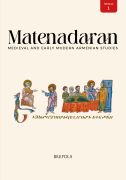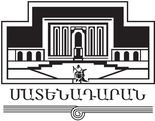Echoes of the Definitions Ascribed to Plato in a Medieval Armenian Compendium
Keywords:
Definitions, Grigor of Jerusalem, Plato, philosophic, scinetific, lexicographical, translation, parallelsAbstract
A certain Gregory of Jerusalem compiled an Armenian collection of philosophical texts before 1267. The core of the collection (which is a series of 365 definitions pertaining to logic, natural philosophy, ethics, epistemology, and other related fields) is a translation of a lost or yet unknown Greek collection. Some definitions, often giving two or three explanations for the same terms, are ascribed to Plato, Aristotle, and the Stoics. The same definitions are arranged in alphabetic order in another collection called “Philosophical Definitions as Questions”. The author of this paper has found parallels for 175 Armenian definitions in works by Plato and Aristotle, as well as in other philosophical and lexicographical texts. 25 definitions have more or less close parallels in the Ὅροι (Definitions) attributed to Plato, some being literal translations. These 25 parallel Armenian and Pseudo-Platonic definitions, with English translations, are presented in the article. Three parallels with authentic passages from Plato follow them.
The passage translated from Plato’s Timaeus differs from the medieval Armenian version of this work. A brief quotation from the latter in the earliest commentary on the Dionysian Grammar by a certain David (probably 6th or 7th century) could possibly shed light on its date, much discussed in Armenology.
Downloads
Published
How to Cite
Issue
Section
License
Copyright (c) 2024 Matenadaran: Medieval and Early Modern Armenian Studies

This work is licensed under a Creative Commons Attribution-NonCommercial 4.0 International License.



